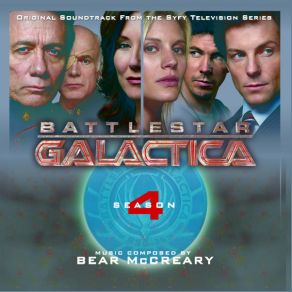Battlestar Galactica: Season 4 (Original Soundtrack from the TV Series)
Download links and information about Battlestar Galactica: Season 4 (Original Soundtrack from the TV Series) by Bear McCreary. This album was released in 2009 and it belongs to World Music, Theatre/Soundtrack genres. It contains 34 tracks with total duration of 02:16:25 minutes.

|
|
|---|---|
| Artist: | Bear McCreary |
| Release date: | 2009 |
| Genre: | World Music, Theatre/Soundtrack |
| Tracks: | 34 |
| Duration: | 02:16:25 |
| Buy it NOW at: | |
| Buy on iTunes $15.99 | |
Tracks
[Edit]| No. | Title | Length |
|---|---|---|
| 1. | Gaeta's Lament | 4:49 |
| 2. | The Signal | 5:08 |
| 3. | Resurrection Hub | 3:40 |
| 4. | The Cult of Baltar | 5:41 |
| 5. | Farewell Apollo | 2:55 |
| 6. | Roslin Escapes | 2:56 |
| 7. | Among the Ruins | 7:44 |
| 8. | Laura Runs | 2:21 |
| 9. | Cally Descends | 3:08 |
| 10. | Funeral Pyre | 3:57 |
| 11. | Roslin and Adama Reunited | 1:59 |
| 12. | Gaeta's Lament (Instrumental) | 4:50 |
| 13. | Elegy | 2:54 |
| 14. | The Alliance | 2:30 |
| 15. | Blood On the Scales | 5:20 |
| 16. | Grand Old Lady | 0:52 |
| 17. | Kara Remembers | 3:27 |
| 18. | Boomer Takes Hera | 2:40 |
| 19. | Dreilide Thrace Sonata No. 1 | 5:34 |
| 20. | Diaspora Oratorio | 4:52 |
| 21. | Caprica City, Before the Fall | 4:34 |
| 22. | Laura's Baptism | 2:40 |
| 23. | Adama In the Memorial Hallway | 2:11 |
| 24. | The Line | 3:56 |
| 25. | Assault On the Colony | 15:08 |
| 26. | Baltar's Sermon | 4:25 |
| 27. | Kara's Coordinates | 4:21 |
| 28. | Earth | 3:07 |
| 29. | Goodbye Sam | 2:10 |
| 30. | The Heart of the Sun | 3:20 |
| 31. | Starbuck Disappears | 2:08 |
| 32. | So Much Life | 5:01 |
| 33. | An Easterly View | 4:52 |
| 34. | The Passage of Time | 1:15 |
Details
[Edit]The second television series to be called Battlestar Galactica ran on the Sci Fi (later renamed Syfy) Channel between 2004 and 2009, meaning that it was on the air significantly longer than the first series, which ran from 1978 to 1980. Throughout its tenure, composer Bear McCreary provided background music, and his efforts on behalf of the first three seasons have been captured on previous soundtrack albums by La-La Land Records. This final two-CD collection is drawn from the fourth season and the concluding mini-season (referred to in a press release as season 4.5), which was dubbed "Daybreak," with one disc devoted to each. Partly out of necessity, McCreary recast conventional notions of what constituted space music in his early work for the series. He didn't have the budget for an orchestra, so he decided that in his musical interpretation of the space-traveling future, the music would be a mixture of existing world music, much of it played on ethnic instruments. Also, he was especially fond of Japanese taiko drums, and his music proved percussion-heavy. By the third season, there seemed to be more money for the music, and McCreary began to mix in more familiar string orchestrations. That trend continues here, as the usual army of Hollywood violin, viola, and cello players makes itself felt in big orchestral cues. But McCreary has not given up on his ethnic favorites, especially on the first disc. Uilleann pipes give a Celtic sound to "Farewell Apollo," for example, with an Irish whistle producing a similar effect on "Grand Old Lady." "Cally Descends" and "Boomer Takes Hera" both draw on Indian music. For the "Daybreak" episodes, McCreary relies much more heavily on the strings, but they have to make room for his pounding drums. He does not use drums just to keep the beat or provide accents. If anything, the drums are the dominant musical element in his music. Any orchestra considering an evening of McCreary music in the future should be warned: expect to pay the timpani section extra, and have substitutes ready, just in case.